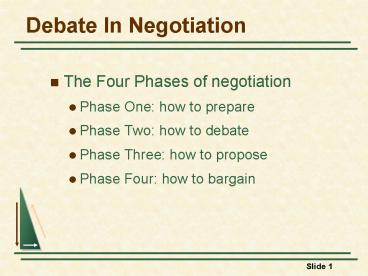Debate In Negotiation
1 / 27
Title:
Debate In Negotiation
Description:
Slide 1. Debate In Negotiation. The Four Phases of ... It is appropriate to interrupt somebody who is clearly factually incorrect in their statements ... – PowerPoint PPT presentation
Number of Views:85
Avg rating:3.0/5.0
Title: Debate In Negotiation
1
Debate In Negotiation
- The Four Phases of negotiation
- Phase One how to prepare
- Phase Two how to debate
- Phase Three how to propose
- Phase Four how to bargain
2
Debate In Negotiation
- Debate is the act of two way communication and
shapes the tone of the negotiation - Proposing takes 10 of the time, bargaining less
than 5 and debate takes up the rest more than
80 - Kennedy If we can organise and discipline our
debate behaviour we have a very good chance of
quite dramatically improving our negotiation
effectiveness
3
Rackham and Carlisle
- R C conducted an interesting study where they
sought to describe how effective and average
negotiators behave. - What is an effective negotiator?
- Rated as effective by both sides
- Track record of significant success
- Low incidence of implementation failures
4
Rackham and Carlisle
- Skilled negotiators show marked differences in
their use of specified behaviour categories
compared with average negotiators - Confirmed what everyone knew statistically
- In negotiation training people are introduced to
effective and ineffective categories of
behaviour, and these are further developed
through simulation and role-playing
5
Variances in behaviours
6
Variances in behaviours
7
Types of debate
- The message is that debate can be either
constructive or destructive - Constructive debate moves us towards an
acceptable solution, destructive debate moves us
away from desirable outcomes - What are the destructive behaviours?
8
Destructive behaviours
9
Interruption
- It is appropriate to interrupt somebody who is
clearly factually incorrect in their statements - True or false?
10
Other irritators
- Blocking
- Blocking denies the opportunity to give more
information - Don't block hear them out
- Point scoring
- Attacking/Blaming
- Threats
11
Constructive behaviours
- How do we deal with someone who is behaving
destructively? - The alternative to destructive argument is
constructive debate - There is no alternative to a constructive
approach whatever the behaviour of the other
negotiator
12
Constructive behaviours
13
Assurances
- Gentlemen, I am in the solution, not the
retribution business - How to deal with an angry hotel guestBefore
you say anything, I have three things to say to
you first, I unreservedly apologise for the
distress we have caused you second, I am going
to listen to what you have to say, and third, I
am going to put right whatever is wrong
14
Moving forward
15
Spot the difference?
16
Signalling?
- It would be extremely difficult to meet that
delivery date - We do not normally extend our credit facilities
- It is highly unlikely that my boss will agree to
a free upgrade - Under these circumstances we cannot agree to
compensation - As things stand our prices must remain as listed
- I can't give you a better discount on your
current volume
17
Proposing
18
Proposing
19
Proposing
- Signalling is the bridge from debate to proposal
- Topic of chapter 9 how to make an effective
proposal
20
Proposing look at these
- I wish
- I hope
- I would like
- It would be nice
- Would this suit you?
- I need
- I require
- We prefer
- We want
- It is necessary that
21
Proposing
- It is the ability to shift from loose informal
proposal language to tight formal and assertive
proposal language that improves your performance - A proposal is a tentative suggestion
- We could make it four visits a week
- We could look at the number of visits
22
Look at this proposal
- Effective proposals consist of two parts the
condition and the offer - Ineffective proposals only consist of offers
- The condition may be vague or specific, but the
offer must always be vague
23
Proposing
- Kennedy writes The most common mistake
negotiators make when presenting a proposal is to
drown it in irrelevant verbiage by confusing the
proposal and debate phases. In short, they
propose and explain their proposals at the same
time
24
Proposing
Make a proposal, then shut up.
25
Effective proposals
- To make an effective proposal, follow these main
rules should be practised - It should be conditional
- It should be presented unadorned, without
explanation - On completing the proposal you should go silent
- It should be presented with condition first, then
followed by the offer
26
What is wrong here?
27
How to receive a proposal































